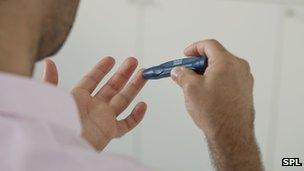Type 1 diabetes vaccine hailed as 'significant step'
- Published

Patients must keep a close eye on blood sugar levels
It may be possible to reverse type 1 diabetes by training a patient's own immune system to stop attacking their body, an early trial suggests.
Their immune system destroys the cells that make insulin, the hormone needed to control blood sugar levels.
A study in 80 patients, published in the journal Science Translational Medicine, showed a vaccine could retrain their immune system.
Experts described the results as a "significant step".
Normally a vaccine teaches the immune system to attack bacteria or viruses that cause disease, such as the polio virus.
Researchers at the Stanford University Medical Centre used a vaccine with the opposite effect - to make the immune system cease its assault.
In patients with type 1 diabetes, the immune system destroys beta cells in the pancreas. This means the body is unable to produce enough insulin and regular injections of the hormone are needed throughout life.
It is a different disease to type 2 diabetes, which can be caused by an unhealthy diet.
The vaccine was targeted to the specific white blood cells which attack beta cells. After patients were given weekly injections for three months, the levels of those white blood cells fell.
'New concept'
Blood tests also suggested that beta cell function was better in patients given the vaccine than in those treated only with insulin.
However, other parts of the immune system seemed to be left intact.
Prof Lawrence Steinman said: "We're very excited by these results, which suggest that the immunologist's dream of shutting down just a single subset of dysfunctional immune cells without wrecking the whole immune system may be attainable.
"This vaccine is a new concept. It's shutting off a specific immune response."
The research is at an early stage and trials in larger groups of people, which measure the long-term effect of the vaccine, are still needed.
Prof Steinman said the effect seemed to last for up to two months so regular boosters would be needed.
Karen Addington, the UK chief executive of the type 1 diabetes charity JDRF, said: "For the first time we have evidence that this particular type of vaccine has an effect in preserving insulin production in humans. This is a significant step forward on the journey towards a world without type 1 diabetes.
"We will build on this exciting DNA vaccine approach. Research into type 1 vaccines is a priority for JDRF's multimillion-pound global research programme. But it is early days. Clinical use is still some time away."
- Published2 January 2013
- Published14 November 2012